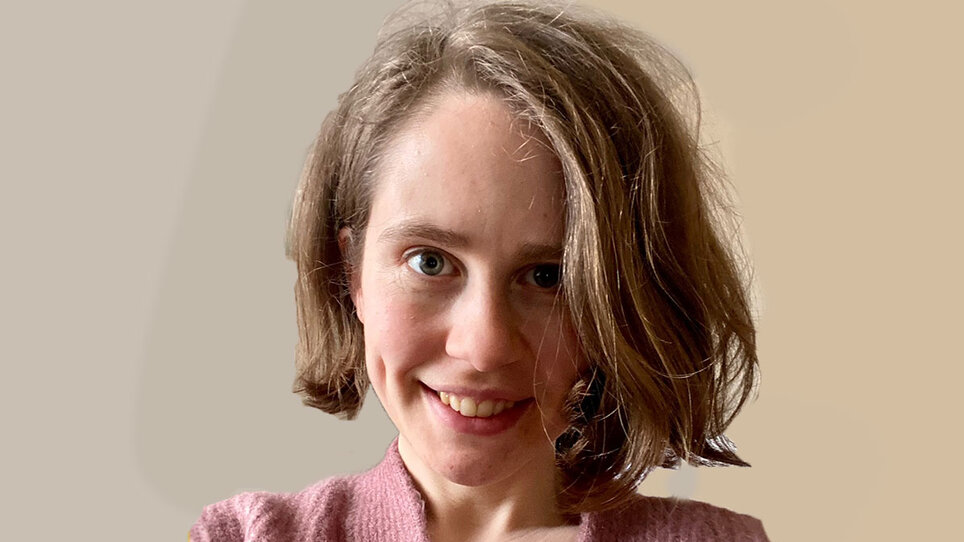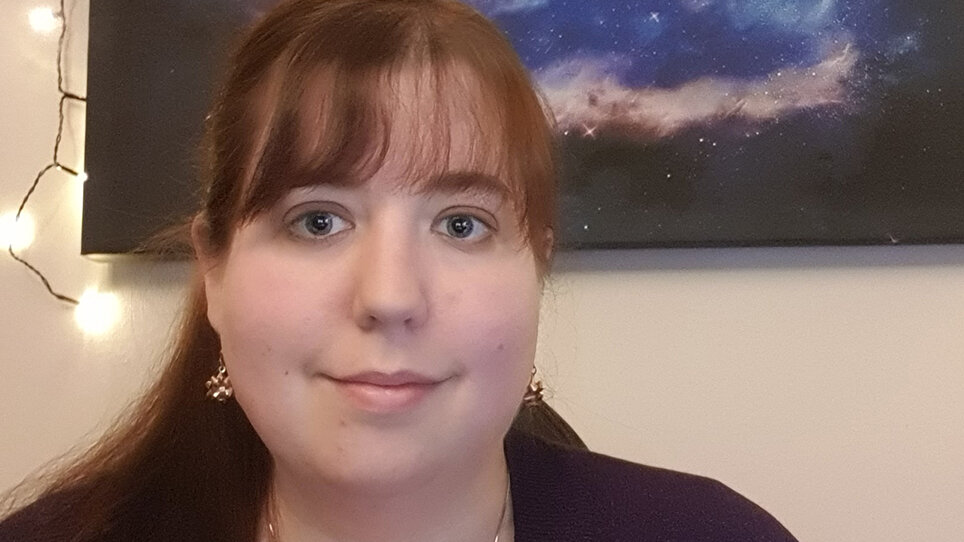Happy International Women's Day 2022!
This year, we asked some of our autistic female colleagues to tell us about an autistic woman they admire. Scroll down to read what they had to say...
Who I admire: Greta Thunberg, Carly Jones, Jesse McNamara, and more...
Nellie Allsop, our charity's Senior Branch Engagement Officer for the North of England, on autistic advocates and content creators she admires.
In September 2019 I was lucky enough to work at the National Autistic Society's Women and Girls conference. At the time, I didn't think I was autistic. Almost exactly a year later, I was diagnosed! I'd always viewed myself as the sibling of an autistic person.

Nellie
It took some adjusting to, but I'm proud to be an autistic woman, and I want to share with you some information about autistic women who have inspired me.
While at the 2019 conference, I heard from many brilliant autistic women. Someone that particularly caught my attention was Carly Jones. Her public speaking skills are brilliant. She combines just the right amount of humour and insight to make her talks both captivating and delightful. In recent years I've realised that I actually thrive off public speaking, so to see someone who was so (seemingly!) confident take to the floor and capture the attention of their audience was great. My mum works in education and is also a big Carly fan - we could start up our own mini Carly fan club!
I couldn’t put together a piece on inspirational autistic women without mentioning the absolute powerhouse that is Greta Thunberg. When I watched I am Greta, I witnessed both the strength and the fragility of a young woman with a passion for her area of interest that (in my opinion) no neurotypical person could ever have.
Keep going, Greta. The world needs more people like you!
I also think it's important to remember that all not all autistic people can be so easily divided into men and women. For example, Jesse McNamara (otherwise known as Plumbella online) is an autistic content creator on YouTube and Twitch. Jesse is agender, and their drive to produce great content, make people laugh and share their creativity with the world is so… brilliant!
I'm also a fan of Cheryl (_thislineismine on TikTok), who shares informative and thought-provoking content on topics like sunflower lanyards, mental health, and how they experience the world. People like Cheryl inspire me to want to create my own online content, so that even more people can learn about autism and mental health.
"I couldn’t put together a piece on inspirational autistic women without mentioning the absolute powerhouse that is Greta Thunberg."

Who I admire: Autistic women of the National Autistic Society
Hermione Cameron, Copywriter at our charity, on her fellow autistic colleagues.
Which autistic woman do I admire most?
I find that a complicated question! Although I was diagnosed young, I wasn’t open about being autistic until a few years ago. To be honest, I was ashamed of my diagnosis. I didn’t really know any other autistic women or girls, so I internalised the myth that being autistic made me somehow unfashionable or not-a-proper-girl.

Hermione
Therefore, I wasn’t really on the lookout for fellow autistic women, both in the media and in my daily life. I tended to identify more with women who had mental health issues (like I do) or other neurological conditions. ‘Anything but autism’ was my subconscious motto. Either that, or I sought out female characters I could diagnose as autistic in the comfort of my own head.
When I started at the National Autistic Society, I began working with some incredible autistic women, and came to the conclusion that we weren’t such a rare breed after all. I realised the myth I had created in my head that autistic women were all weird, unfashionable, or unfeminine was completely unfounded (and that these words were no more than nonsensical labels that had somehow become stuck in the corners of my mind).
Getting to know my female autistic colleagues and hearing their stories gave me the courage to start being openly autistic. And as friends and family will attest to, once I started talking about autism, I wouldn’t shut up...
The more I talked about being autistic, the more other women and gender non-conforming people I knew began to open up about being autistic too - from friends and acquaintances, to that person I met one time at a writing workshop...
It was as if I’d put on a pair of magical autism glasses that allowed me to see all autistic people clearly, not just as pixelated shapes and faded colours. Or, as autistic comedian Hannah Gadsby put it (when talking about her late diagnosis), it was like ‘getting the keys to the city of me’. Although in my case it was more like rediscovering the keys, having buried them at the bottom of my bag for so many years.
Similes aside, it seems strange that I’ve taken this long to realise other people like me exist, to see that autistic people come from all backgrounds, genders, and experiences, and require different levels of support, that we all have so many different gifts and things we struggle with, and that I am not an anomaly or ‘not like other autistic girls.’
It may be a cheesy answer, but for helping me rediscover the ‘keys to the city of me’, my autistic female colleagues are the women I admire most. And I promise I’m not just saying that because I work here!
"Getting to know my female autistic colleagues and hearing their stories gave me the courage to start being openly autistic. "
Who I admire: Carly Jones MBE
Helen Ellis, Equality, Diversity and Inclusion Co-ordinator at our charity, on why she admires Carly Jones.
There are so many fantastic autistic women doing amazing work these days that it’s incredibly hard to choose just one - I could spend all day singing the praises of Holly Smale, Kayla Cromer, Sarah Hendrickx, Sara Gibbs, Gill Loomes-Quinn, Catriona Stewart and so many more fabulous autistic folks!

Helen
I can’t talk about the many autistic women I admire without mentioning the brilliant women who were my fellow participants in the Autism in Pink research project nearly a decade ago! We were an eclectic group with a multitude of different backgrounds, identities, passions, and life experiences. Getting to know the women in the UK group taught me so much about myself.
But on International Women’s Day there is one autistic woman I want to celebrate more than any other: Carly Jones.
Carly is someone I admire so much. She is a phenomenal advocate who has worked tirelessly on improving professionals and policy-makers’ understanding of autism, safeguarding of autistic girls, and what it means to be an autistic parent of neurodivergent and neurotypical daughters!
Carly has been such a wonderful personal friend and professional ally over the years. We wrote our books in parallel, offering each other mutual support and encouragement, looked after each other in times of need at conferences, and have always made time for favour requests, no matter how bizarre!
I was so proud of Carly when she got her MBE. To see her work recognised on that level is so heartening, and I hope that one day I can follow in her very stylish footsteps. The warmth, hope and joy she exudes when talking about her work, her family and her vision for the future is inspiring, and reminds me why we all work so hard to keep changing the world for the better.
Carly Jones, you are a rock star and the epitome of autistic girl power!
"There are so many fantastic autistic women doing amazing work these days that it’s incredibly hard to choose just one."
A brief history of undiagnosed autistic women
Fiona Grace, Web, Creative and Brand Lead at our charity, on undiagnosed autistic women throughout history.
Being asked to talk about inspirational autistic women is a difficult ask. Not because there aren’t any but because there will have been so many – most of whom were never diagnosed. Diagnosis in the UK has only been available since the second half of the last century.

Fiona
Autism is not a new thing. We can assume from the dawn of time that autistic women were on the planet, slightly baffled by it but also using their unique way of thinking to devise solutions to challenges - just as many undiagnosed autistic men were.
I often wonder about those women, and how they will have made progress with their inventive brains. But I also feel a great sadness about how many of them would have been abused and mistreated by their societies, ridiculed and persecuted for their ‘strange ways’ and many locked away in institutions.
Autistic people are often direct, honest, principled and prepared to stay true to their convictions - traits that have always been championed in men but have historically been interpreted as ‘troublesome’ ‘disruptive’ and ‘not becoming’ in women.
I like to think that some of the first women to reject uncomfortable and restrictive female attire were autistic. Or that some of the early women who overcame the ludicrous barriers put in their way to getting an education were on the spectrum – driven by their unstoppable desire to learn more about their special interests.
So I want to remember all the autistic women, most of whom wouldn't have known they were, who have gone before us.
"I want to remember all the autistic women, most of whom wouldn't have known they were, who have gone before us."
![]()
